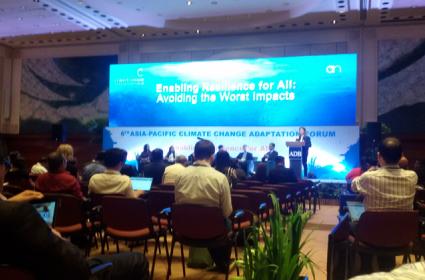Climate Change: Water Scarcity Will Become A Major Challenge

By Jose Kalathil
Climate change affects all, whether it is a human being or any other living creature. It is anticipated to have an increasing impact on human health, security, livelihoods, and poverty levels in Asia and the Pacific. Warming trends and temperature extremes have been observed throughout the region, while water scarcity is expected to become a major challenge. Food productivity and human security is projected to decline in many Asian countries. Sea level rise is likely to lead to further coastal erosion. For the low-lying islands of the Pacific, sea level rise is a significant threat, impacting livelihoods, infrastructure, farming and water resources. Outbreaks of malaria and dengue are increasing in frequency. Both climatic and non-climatic drivers are affecting the extreme vulnerability of the Pacific region. Moreover, many unpredictable things that are happening around the world like floods and droughts, earthquakes and tsunami, are slowly bleeding our economies.
So, it was timely and appropriate that the United Nations Environment Programme-Asia-Pacific Adaptation Network (UNEP-APAN) organized the Climate Change Adaptation Forum for the sixth time in Manila recently to discuss ways to make the world a better and safer place to live in. The event was attended by about 800 experts, social activists, scientists, and government officials from 60 countries. The delegates also included representatives from international scientific and funding organizations. The three-day event was co-hosted by the Climate Change Commission, Philippines, the Government of the Republic of Palau, and the Asian Development Bank.
In the brain-storming sessions spread over three days, the participants discussed the theme of the Forum, ‘Enabling Resilience for All: Avoiding the Worst Impacts.’ They also discussed four streams of the theme such as Resilience in human and social systems, Resilience of natural ecosystems, Resilience of industry and the built environment and Resilience of island communities.
Since the impact of climate change affect the poor and the marginalized the most, the participants felt that the damages, threats and vulnerability of such calamities should be shared by all. Experts said that since the entire planet is under threat, actions should be taken as a matter of urgency. They added that several actions have been taken across the world, especially Nepal, Bangladesh and Sri Lanka. They also said that the security of all vulnerable people should be ensured.
Mr Anand Patwardhan, Director General of the International Centre for Climate Change and Development, in his keynote address delivered from Stockholm exhorted countries to share knowledge on adaptation with other nations for the benefit of others. He could not attend the conference as the previous day a Global Commission on Adaptation was signed in Hague between his organisation, former UN secretary-general Ban ki-Moon and Bill Gates.
He urged the participants to create opportunity to make money from adaptation. Mr Patwardhan also wanted national governments to think about financing such ventures. In continuation to his talks, Mr Saleemul Huq, Director, International Centre for Climate Change and Development, urged APAN to take financing as a main subject instead of side one. Four youths, Mr Alex Rendell, Founder, Environmental Education Centre, Thailand, and social reformer, Ms Antoinette Taus, Founder, Planet Cora and UN Advocate for Life Below Water (SDG 14), Philippines, Ms Dina Farooq Malik, Co-founder of SEPLAA Young Leaders Club, Pakistan, and Ms Miel Sequeira-Holm, Chairlady, Heirs to Our Oceans, Palau, enlightened the participants with the work they are doing.
On return, at the airport, I picked up two newspapers, The Nation, being published from Thailand and The Philippine Star. While glancing through the newspapers, I found two articles on climate change published in them --- one on a new “Hyper alarming” study showing massive insect loss even in protected natural reserves and the other on Pasig River winning the first Asia River Prize award.
According to the study, there is dramatic decline in invertebrate populations. Biologists estimate that in the past 35 years, the abundance of invertebrates such as beetles and bees had decreased 45 per cent. “This study is a real wake-up call that the phenomenon could be much, much bigger, and across many more ecosystems,” says David Wagner, an expert in invertebrate conservation at the University of Connecticut. The study also found that the number of insect-eating frogs has also decreased. The authors blamed the effects of weather like hurricanes as well as the use of pesticides and other chemicals in the area for this situation.
The International River Foundation, announcing the winner for the award said, “Critical to the success of the story was bringing the community, around 18,000 people to decent housing and transforming these communities and their lives into environmentally responsible citizens.”














